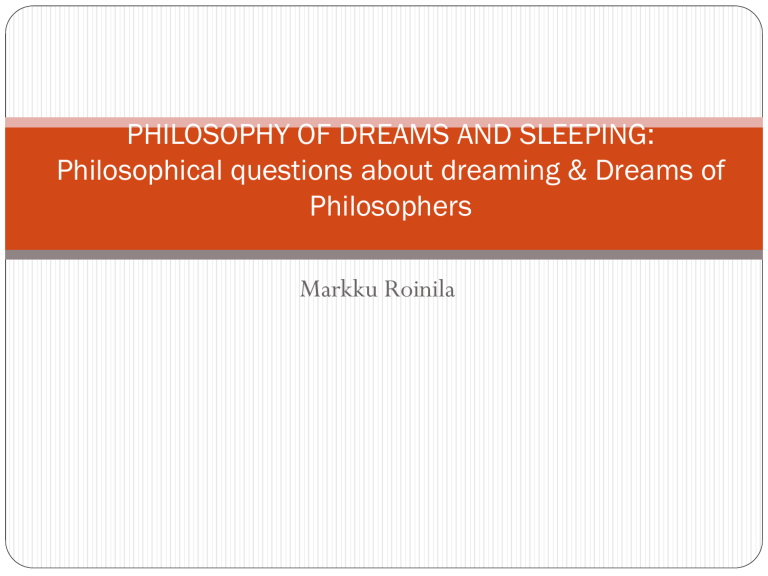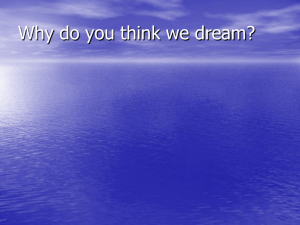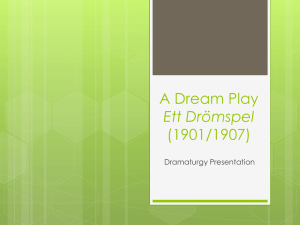Philosophical Questions of Dreaming

PHILOSOPHY OF DREAMS AND SLEEPING:
Philosophical questions about dreaming & Dreams of
Philosophers
Markku Roinila
Introduction
Philosophy of dreaming is nowadays usually thought to be part of the philosophy of psychology.
As a topic it is very much underdeveloped area of study despite the fact that it very interesting and has illuminating relations to many other areas of philosophical studies such as epistemology, philosophy of mind (especially consciousness), philosophy of psychology, metaphysics, scientific methodology and ethics.
Philosophy of dreaming also combines in a very interesting way the physiology (modern neuroscience) with phenomenology (our dream experiences).
It is also naturally interesting to the learned public outside academic circles.
Philosophical questions about dreaming
The history of philosophy of dreaming is almost as old as philosophy itself. In ancient philosophy Plato,
Aristotle and the Stoics, among others, were interested in the dream-world which was so different from the normal waking life. This created a metaphysical question: how do I know I am awake? Maybe all of this I experience is a dream? Can I trust my senses?
The idea was led to the utmost by George Berkeley who argued that we have knowledge only on what we perceive. So if we perceive in dreams unicorns, they exist.
Traditional philosophical question are mostly related to the content of the dreams as there was no way of thinking about the form of the dreams (brain functions, that is). However, there are some ancient philosophers like Democritus and Aristotle who thought about the physiology of dreams.
For this reason, the contemporary philosophy of dreaming has partly different questions about dreaming, as it is impossible to ignore the development and results of the modern neuroscience.
Some traditional philosophical questions of dreaming
Four classical problems about dreams (Flanagan: Dreaming Souls)
1) Whether it is possible to know for certain that one is awake and not dreaming and vice versa (e. g. Plato, Descartes, Bergson, Russell); can I feel pain while sleeping?
2) Whether dreams are experiences we have while sleeping or fabrications that we make up after we awake ( > remembering-problem, e. g. Leibniz, Kant, Hume,)
3) Whether we can be immoral in dreams (important for St. Augustine & medieval theologians, for example, but also contemporary ethics); morality in lucid dreaming
4) Whether my self disappears when I go to sleep (does the continuity of consciousness disappear) (e.g.Locke, Malcolm, Dennett); are dreams conscious mental states?
One can add Flanagan’s own question: Does dreaming have an evolutionary function? (Freud, Jung, Flanagan, Revonsuo); Does dreaming have a function in the first place?
Remembering dreams
Controversy between Descartes and Hobbes
Locke: Dreams are mixtures of memory fragments of waking life
Flanagan: Even though we don't remember all our dreams, they may have a role in our psychological life
– some event seen in dreams may affect our waking life (for example, my own death, an accident etc.).
Psychological tests confirm this: one can remember things which were told to the person when he or she was sleeping.
Do dreams affect my development?
What biological ends, if any, was dreaming designed to serve?
What psychological or cultural end? Or are there such ends at all?
Do dreams have a meaning? > religion, art, psychology, predictions (astrology)
Flanagan: Even if it is rare for dreams to express the true and the sensible, this is no objection to the idea that some dreams contribute to making me who I am, are self-revealing and are possibly worth for self-exploration. Thus the answer to question
“Can dreams help in seeking self-knowledge?” is yes. > Personal identity.
If dreams have this function, one would be able to argue against neuroscientists that it is not only a question of brain activation. In fact, this view would be closer to the one of David Foulkes.
Creativity & Dreams
Leibniz: Dreams in a way show us possibilities we can reach if we really try – kind of platonic forms or pretaste of the joys of heaven
Many artists report having been inspired by dreams (for example,
Mary Shelley’s Frankenstein)
This can be related to the idea that dreams are a kind of thinking and certain thoughts are more inspiring than others.
In some cases one could even say that dreams are a sort of philosophical process which can give you new thoughts, be they in artistic or philosophical form.
Judgment & dreams
Do we make judgements in dreams – in other words, can one perform valid inferences while sleeping?
This is related to the sceptical problem and the problem of consciousness, that is can we be conscious of ourselves when sleeping.
According to Norman Malcom, one cannot judge ”I am now sleeping”
Malcolm’s view has been challenged many times in various ways.
Questions by John Sutton
The following are from Sutton: ”Dreaming” (I will return to these in the last lectures)
What are the best metaphysical and methodological approaches to understanding relations between the phenomenology and the neurophysiology of dreams? (combining experience of dreams to results of sleep labs)
What room is there for an integrated cognitive level of analysis through which accounts of representation and computation can interlock with more general theories in cognitive science? (What can the study of dreams tell us about consciousness in general?)
What are the theoretically and empirically plausible roles of motivation, emotion, imagination, and memory in dreaming? (contents of dreams)
Are there conceptual suggestions that might help clarify or resolve the scientific disagreements over the extent and nature of bizarre mentation in dreaming, and over children’s dreaming? (NREM vs. REM-sleep; do we learn dreaming?; )
Do individually and culturally variable beliefs about dreaming only influence dream reports, or is the form of dreams themselves in certain respects also malleable? (reliability of dream reports)
Most broadly, is dreaming a quasi-perceptual hallucination or an imaginative construct? (are the dreams based on waking imagery or are they imagined?)
Recent philosophical work on dreams
The question of scepticism of our empirical experiences
(appearance vs. reality) has long been the most common touching-point of philosophy of dreams (in epistemology)
– for example Dunlop (ed.), Philosophical Essays on
Dreaming (Cornell, 1977)
In philosophy of mind dreams have not raised much interest despite the close relationship with consciousness.
Only very recently the results of neuroscience have started to affect to the theory of dreams in philosophy. For example:
Dennett: ”Are Dreams Experiences?” Philosophical
Review 73: 151–71; Churchland, “Reduction and the
Neurobiological Basis of Consciousness,” in A. J. Marcel and E. J. Bisiach (eds), Consciousness in Contemporary Science,
Oxford: Oxford University Press, pp. 273–304
Flanagan: Dreaming Souls (2000)
Sutton: “Dreaming” (2009; http://philpapers.org/rec/SUTD)
Complaints by Sutton
John Sutton laments in his article ”Dreaming” that although there is some recent development in the philosophy of dreaming, the discipline is in a very primitive state compared to, for example, philosophy of emotions, memory, colour vision etc.
However, there is nowThe
International Association for the
Study of Dreams (IASD) and journal Dreaming. (Available as e-resources in HELKA)
Subjectivity of dreaming
One basic difficulty in achieving ”scientific” results of dream content is the subjectivity of dreaming. We have to trust on dream reports which are subject to various verbal skills, sleeping conditions etc.
Thus prevents us to combine the
”phenomenology” of dreaming to the latest neuroscientific results.
According to Flanagan, a robust theory of the nature and function of dreams will need to bring into play philosophy, phenomenology, neuroscience, pscyhology, psychiatry, evolutionary biology, sociology, anthropology, literature etc.
I will discuss the prospects of the future of philosophy of dreaming in the last lecture of this series.
Famous philosophical dreams
There are a number of interesting dreams with philosophical content, either reported or fabricated by philosophers in various times.
However, there are actually surprisingly little dream reports by philosophers (not to mention contemporary philosopher Owen
Flanagan (see Dreaming Souls) and it is often impossible to tell whether the dreams reported were actually seen or not.
Sometimes these dreams reflect the philosophical questions the philosophers were working with or even inspired them in their strivings for solutions. For this reason they are interesting and worth looking at.
Dream of Socrates
In dialogue Crito Plato presents Socrates as telling a dream (44a-b). The context in the dialogue is that Socrates is sentenced to death and his friends are trying to persuade him to escape.
Soc.What! I suppose that the ship has come from Delos, on the arrival of which I am to die?
Cr. No, the ship has not actually arrived, but she will probably be here to-day, as persons who have come from
Sunium tell me that they have left her there; and therefore to-morrow, Socrates, will be the last day of your life.
Soc.Very well, Crito; if such is the will of God, I am willing; but my belief is that there will be a delay of a day.
Cr.Why do you say this?
Soc. I will tell you. I am to die on the day after the arrival of the ship?
Cr.Yes; that is what the authorities say.
Soc. But I do not think that the ship will be here until to-morrow; this I gather from a vision which I had last night, or rather only just now, when you fortunately allowed me to sleep.
Cr. And what was the nature of the vision?
Soc. There came to me the likeness of a woman, fair and comely, clothed in white raiment, who called to me and said: O Socrates-
"The third day hence, to Phthia shalt thou go."
Cr.What a singular dream, Socrates!
Socrates’ dream is predicting the future and the information is given by a Goddess or such-like figure. Thus
Plato’s description (or Socrates’ – it is hard to tell which) follows the common Egyptian and Greek practice where messages are received from Gods concerning the future.
Augustinus’ Confessions
In Confessions, X, ch. 30 St. Augustine talks to God of his problem of dreams:
”You commanded me not to commit fornication, and though you did not forbid me to marry, you counselled me to take a better course. You gave me the grace and I did your bidding, even before I became a minister of your sacrament. But in my memory, of which I have said much, the images of things imprinted upon it by my former habits still linger on.
When I am awake they obtrude themselves upon me, though with little strength. But when
I dream, they not only give me pleasure but are very much like acquiescence in the act.”
“The power which these illusory images have over my soul and my body is so great that what is no more than a vision can influence me in sleep in a way that the reality cannot do when I am awake. Surely it cannot be that when I am asleep I am not myself, O Lord my
God? And yet the moment when I pass from wakefulness to sleep, or return again from sleep to wakefulness, marks a great difference in me.“
St. Augustine is in a sense Freudian model example – the sexual wishes are repressed when we are awake, but when we sleep, they come to haunt us. He is concerned that he commits sin in his dreams and laments this to his creator.
The three dreams of Descartes
On 10. 11. 1619 René Descartes (in the age of 23) saw three dreams which have become famous despite the fact that he decided not to include them in his short autobiography in
Discourse on the Method 20 years later.
Despite this, they were reported by many to be elemental to his intellectual development and
Descartes contemplated pilgrimage because of the dreams.
In the background was a mental crisis or nervoud breakdown and search for a new direction. Descartes was disappointed with scholasticism and was trying to find a meaning in his life. Thus he concentrated to meditation, reaching a kind of delirious state and this is where the dreams occurred.
Stove-heated room
In the autobiographical note in Discourse Descartes does not mention dreams, but talks about a stoveheated room which would no doubt make one sleepy. After this description Descartes goes on to describe the new method of thinking he developed which lead to the sceptical foundation of his philosophy (teh cogito-argument; see his
Meditations on the First Philosophy).
” I was then in Germany, attracted thither by the wars in that country, which have not yet been brought to a termination; and as I was returning to the army from the coronation of the Emperor, the setting in of winter arrested me in a locality where, as I found no society to interest me, and was besides fortunately undisturbed by any cares or passions, I remained the whole day in seclusion, with full opportunity to occupy my attention with my own thoughts.”
(Discourse, part II)
Baillet’s story
Descartes’s first biographer, Adrien
Baillet has another version of this important day in 1619 which became known when Baillet’s published his biographyVie de
Monsieur Des-Cartes in 1691.
Baillet argued that the vision
Descartes saw was in fact founded on dreams. He found a narrative of three dreams by Descartes was written in Latin (titled Olympica), but was never published and later lost.
For this reason, there simply is not any reliable knowledge of the dream reports, whether they were genuine or not. However, most scholars think they are.
First dream
Descartes saw three dreams during one night and he woke up after each dream to contemplate it.
The following narrations are from Baillet’s book; on this topic, see Michael Keevak: ”Descartes’s
Dreams and Their Address for Philosophy” (Journal of the History of Ideas, vol. 53, 3 (1992), pp.
373-396; Sebba: The Dream of Descartes, Southern Illinois University Press, 1987); Challenger:
Somnia, ergo sum (http://wrt-brooke.syr.edu/courses/760/hypertxt/dlc.somnio/somnav.html);
Gaukroger: Descartes. An Intellectual Biography, Oxford University Press, 1995, pp. 106-109.
In the first dream (AT X, 181-182) Descartes imagines that he is trying to walk in the midst of a whirlwind, escaping from phantoms or ghosts and must turn to a college church for refuge. He had pain on his right side and because of this he was forced to lurch to the left. Before Descartes was able to enter to the church to pray, he realized that he had just passed a man whom he recognized but had failed to acknowledge. Attempting to retrace his steps, he was thrown against the wall of the chapel by the wind. At the same moment, he saw someone else who called him by name and told him that if he wanted to seek out Monsieur N. he would give him something. He imagned this to be a melon which had come from a foreign country. The man was surrounded by people, who to his surprise were able to stand up straight whereas he was still only able to stand leaning to the side.
Finally, he noticed that the wind was becoming less and less violent, and at that point he awoke, feeling a sharp pain in his left side.
The dream is clearly a sort of nightmare – there is a storm which is real for only him, not for others, there are bizarre elements (melon) and external stimulus (pain in the left side).
Second dream
After the first dream Descartes prays shelter for evil spirits for two hours before falling in sleep again. Immediately he saw a second dream.
In the second dream (AT X, 182) Descartes hears a piercing noise which he takes for thunder and he opened his eyes to find that his room is full of sparks. He is not sure if he is awake or sleeping. The sparks prevent him seeing the things in his room.
He is upset, but by alternatively opening and closing his eyes and looking at the objects made visible around the room, he is able to get rid of the sparks, calm himself and return to sleep. So this time he trust to reason rather than God
(medieval vs. modern), finding a way to remedy the situation.
This second dream can perhaps be described as night terror.
Third dream
The last dream (AT X, 182-186) is the longest and different from others. In Olympica
Descartes notes that the last dream was not frightening. In fact, he found it very soothing.
Here it is told by Stephen Gaukroger:
Descartes began by noticing a book on a table. He opened it and was pleased to see that it was an encyclopaedia or dictionary, which he believed might prove useful. At the same time, he also discovered a second book, a collection of poems entitled Corpus Poetarum
[Collection or anthology of poetry in Latin]. Opening this book, he chanced upon the words Quod vitae sectabor iter? (what road in life shall I follow?).
As he was reading, a stranger entered and gave him some verses beginning with the words
est et non (it is and is not). The man told Descartes of the excellence of the poem, and
Descartes replied that he knew it well: it came from the Idylls of Ausonius, whose poems were included in the anthology on the table.
He looked through the volume to find these poems, and the man asked him where he had got the anthology from. He was unable to tell him, and then noticed that the book had disappeared. It was now at the other end of the table, and the dictionary had changed into a slightly different one. He found Ausonius' poems, but not the one beginning est et non.
Turning to the man, he told him he knew an even better poem beginning Quod vitae sectabor
iter? On opening the book he noticed several copperplate portraits in it, which he thought he recognized. At this point, the man and the book both disappeared.
Lucid part
After these dreamings, while remaining asleep, Descartes asked himself whether he was imagining all this or whether it was real, and he began to ask about its significance. The dictionary is taken to represent all of the sciences, and the Corpus the union of philosophy with wisdom. Poets, he tells us, often have more profound things to say because of the divine nature of their inspiration, 'which makes the seeds of wisdom, which are found in the minds of men like the sparks of fire in flints, emerge with much more ease and clarity than can be accomplished by the reasoning of philosophers'. The words Quod
vitae sectabor iter? he interprets as wise counsel, possibly even a moral maxim.
At this point Descartes wakes, but continues to interpret the dreams along the same lines. The Corpus represents revelation and inspiration, while the est et non is interpreted as the 'yes and no' of the Pythagoreans, standing for truth and error. The third dream he sees as enlightenment about the future, the other two as a form of reprimand for his earlier life. The melon he takes to symbolize the charms of solitude. The pain in his left side represents the devil trying to prevent him from going where he wants, and God does not let him enter the chapel because it is the devil who is pushing him there. The terror experienced in the second dream is a kind of remorse for his sins, and the thunderclap a sign that the spirit of truth is about to descend. These do not help us much, but are interesting as curiosities and from the point of view of intellectual history.
Some reflections
It is clear that the first two dreams are
”real” dreams, in this case nightmares.
The third dream is partly lucid as
Descartes starts to interpret his dream and the preceding two dreams. At the same time is stylized and probably not very true to the dream itself. The narrative seems to have a purpose, to illustrate his later invention (common device of litterature of the time).
The last dream is seen as representing a new direction whereas the first two were describing his earlier life. Indicative of this is the question in the poem anthology:
”What road in life shall I follow?”
So one can see a connection to the intense meditations Descartes was undertaking.
Some views by Donald Challenger in
Somnio, ergo sum: http://wrtbrooke.syr.edu/courses/760/hypertxt/d lc.somnio/somnav.html
Reactions
As Descartes’s dreams are the most famous in the history of philosophy, there have been several comments in them.
Baillet, his biographer wrote: ”This last thought (the signal of the spirit of truth) surely contained a bit of enthuasiasm, and it might incline us to believe that M.
Descartes had been drinking the evening before he went to bed…But he assures us that he had passed the evening and all the preceding day in complete sobriety, and that for three whole months he had drunk no wine” (AT X, 186).
Leibniz saw the dreams belonging to the Rosicrucian tradition.
Freud declined to speculate on the meaning of these dreams, pointing out that the content of the 3rd dream was mostly symbolic in a way more characteristic of conscious processes than the two others and that without some association of ideas on the part of Descartes the interpretation of the unconscious elements in the dreams was impossible.
Others psychologists have interpreted the first two dreams as result of sexual guilt and the third as an intellectual dream. But they all seem to be connected to the intellectual discovery has was about to make.
What direction?
So what was the direction Descartes found in the 3rd dream or was inspired to find because of the dream?
There is no certain answer, but it is probable that it was the sceptical method
(remember, the story plays a central part in his Discourse on the method).
As we remember, the method is systematical doubt Descartes decribes in his first Meditation:
” Some years ago I was struck by how many false things I had believed, and by how doubtful was the structure of beliefs that I had based on them. I realized that if I wanted to establish anything in the sciences that was stable and likely to last, I needed—just once in my life—to demolish everything completely and start again from the foundations. It looked like an enormous task, and I decided to wait until I was old enough to be sure that there was nothing to be gained from putting it off any longer. I have now delayed it for so long that I have no excuse for going on planning to do it rather than getting to work. So today I have set all my worries aside and arranged for myself a clear stretch of free time. I am here quite alone, and at last I will devote myself, sincerely and without holding back, to demolishing my opinions > Cogito, ergo sum.
http://www.youtube.com/watch?v=l6EHgYXcm1Q
Spinoza’s black, scabby Brazilian
Michael A. Rosenthal: ”The Black, Scabby Brazilian: SomeThoughts on Race and Early
Modern Philosophy”, Philosophy of Social Criticism 31 (2005)
Spinoza’s letter to Balling 1664:
”When one morning just at dawn I awoke from a very deep dream, the images which had come to me in the dream were present before my eyes as vividly as if they had been real things, in particular the image of a black, scabby Brazilian whom I had never seen before.
This image disappeared for the most part when, to make a diversion, I fixed my gaze on a book or some other object; but as soon as I again turned my eyes away from such an object while gazing at nothing in particular, the same image of the same Ethiopian kept appearing with the same vividness again and again until it gradually disappered from sight.”
Spinoza’s uses the narrative to argue that dream visions are illusionary. In fact, he uses a similar technique as Descartes in his second dream, fixing attention to something else.
Thus the dream can be called lucid.
Spinoza attributes the cause of the dream to corporeal causes, to a kind of delirium.
Rosenthal interprets the content of the dream to show that Spinoza had racial prejudice.
Leibniz’s philosophical dream
Translation by Donald
Rutherford
(http://philosophyfaculty.
ucsd.edu/faculty/rutherfo rd/leibniz/dream.htm).
The text was found in
Leibniz’s philosophical papers, so it should be genuine. The text is probably from 1680’s.
Leibniz’s philosophical dream
“I was satisfied with what I was among men, but I was not satisfied with human nature. I often considered with chagrin the hardships to which we are subjected, the shortness of our life, the vanity of glory, the improprieties that are born of sensual pleasure, the illnesses that overwhelm even our spirit; finally, the annihilation of all our greatness and all our perfections in the moment of death, which appears to reduce to nothing the fruits of our labors…”
Leibniz was an Enlightenment thinker before Enlightenment, so the topic is very common in him
– how to help mankind and promote perfection and advance of science. In a Cartesian manner, he meditates on difficult problems and as we soon see, dreams on related topics.
“These meditations left me full of melancholy. I naturally loved to act well and to know the truth. Yet it appeared that I punished myself unnecessarily, that a successful crime was worth more than an oppressed virtue, and that a madness that is content is preferable to an aggrieved reason. However, I resisted these objections and directed my spirit on the right course by thinking about the divinity who must have given a proper order to everything and who sustained my hopes with the expectation of a future capable of redressing everything. This conflict was renewed in me by the sight of some great disturbance, either among men, when I saw injustice triumph and innocence chastened, or in nature, when hurricanes or earthquakes destroyed cities and provinces and caused thousands to die without distinguishing the good from the wicked, as though nature cared no more for us than we trouble ourselves about ants or worms that we encounter in our path. I was greatly moved by these spectacles and could not stop myself pitying the condition of mortals… “
This passage anticipates Theodicy, Leibniz’s great work on divine justice where it is shown that our efforts will be rewarded and the wicked will get their punishment in the long run.
Leibniz’s philosophical dream cont.
“One day, being fatigued from these thoughts, I fell asleep and found myself in a dark place which resembled an underground cavern. It was vast and very deep and everywhere there swarmed men who strangely rushed into the darkness in pursuit of luminous trifles they called "honors," or glittering little flies they called
"riches." There were many who searched the ground for bright bits of rotten wood they called "sensual pleasures." Each of these evil lights had its followers; there were some who had changed parties and others who had quit the chase altogether because of exhaustion or despair. Some of those who ran blindly and often believed they had reached their goal fell into crevasses, out of which only moans were heard. Some were bitten by scorpions and other venomous creatures that left them wretched and often mad. Yet neither these examples nor the arguments of persons better informed stopped others from chasing the same hazards and even entering into fights in order to forestall rivals or keep themselves from being forestalled.”
It is clear that Leibniz’s dream is not really a dream, but rather an allegory following the medieval tradition. Anyway, here Leibniz “dreams” of rat-race where people strive for honour, wealth or sensual pleasure. And the game is merciless. One can also interpret this as the Hobbesian state of nature.
Leibniz’s philosophical dream cont.
“In the vault of this huge cavern there were little holes and almost imperceptible cracks.
Here a trace of daylight entered; yet it was so weak that it required careful attention to notice it. One frequently heard voices which said, "Stop you mortals, or run like the miserable beings you are. Others said, "Raise your eyes to the sky." But no one stopped and no one raised their eyes except in pursuit of these dangerous trinkets…”
Light was a common metaphor for reason in Early Modern times.
“I was one of those who was greatly struck by these voices. I began often to look above me and finally recognized the small light which demanded so much attention. It seemed to me to grow stronger the more I gazed steadily at it. My eyes were saturated with its rays, and when, immediately after, I relied on it to see where I was going, I could discern what was around me and what would suffice to secure me from dangers. A venerable old man who had wandered for a long time in the cave and who had had thoughts very similar to mine told me that this light was what is called "intelligence" or "reason" in us. I often changed position in order to test the different holes in the vault that furnished this small light, and when I was located in a spot where several beams could be seen at once from their true point of view, I found a collection of rays which greatly enlightened me. This technique was of great help to me and left me more capable of acting in the darkness.”
Light of the soul was used by philosophers to signify reason and often innate ideas, too.
Here Leibniz also shows how more reason helps us to act in our daily lives.
Leibniz philosophical dream cont.
“After testing many positions, I was at last led by my good fortune to a place which was unique and the most advantageous in the cave, a place reserved for those whom the divinity wished to remove completely from this darkness. ..”
Typically for Leibniz, there are unique optimums, in this case the kind of divine location for mortals.
“Hardly had I begun to look upward than I was surrounded by a bright light shining from all sides: the whole cave and its miseries were fully disclosed to my eyes. But a moment later a dazzling clarity surprised me. It soon expanded and I saw before me the image of a young man whose beauty enchanted my senses. There seemed a majesty about him, which produced a veneration mixed with apprehension; yet the gentleness of his gaze reassured me. I began, however, to be aware of myself weakening and was about to faint, when I felt myself touched by a bough imbued with a marvelous liquor. I could compare it to nothing I had ever felt before and it gave me the strength to endure the presence of this celestial messenger. He called me by name and spoke to me in a charming voice: "Give thanks to the divine goodness which releases you from this madness."
This passage brings to mind the Greek theories of divination where the Gods and their messengers visit the dreams.
Leibniz philosophical dream cont.
“At the same time he touched me again and at that instant I felt myself rise. I was no longer in the cavern; I no longer saw the vault above me. I found myself on a high mountain, which revealed to me the face of the earth. I saw at a distance what I only wanted to consider in general; yet when I studied some spot in a determined way, it at once grew and I needed no other telescopic vision than my own attention to see it as though it were next to me. This gave me a marvelous pleasure and emboldened me to say to my guide: "Mighty spirit--for I cannot doubt that you are of the number of those celestial figures who make up the court surrounding the sovereign of the universe--since you have wanted to clarify so my eyes, will you do as much for my mind?“
Dream-like elements: flying, superhuman sight
Leibniz philosophical dream cont.
“It seemed to me that he smiled at this speech and took pleasure in hearing of my desire. "Your wish is granted," he said to me, "since you hold wisdom above the pleasure of those vain spectacles the world presents to your eyes. However, you will lose nothing that is substantial in those same spectacles. You will see everything with eyes clarified in a completely different way.
Your understanding being fortified from above, it will discover everywhere the brilliant illumination of the divine author of things. You will recognize only wisdom and happiness, wherever men are accustomed to find only vanity and bitterness. You will be content with your creator; you will be enraptured with the vision of his works. Your admiration will not be the effect of ignorance as it is with the vulgar. It will be the fruit of knowledge of the grandeur and marvels of God. Instead of scorning with men the unravelled secrets, which in earlier times they regarded with astonishment, you will find that when you are admitted into the interior of nature your raptures will go on growing the farther you advance. For you will only be at the beginning of a chain of beauties and delights that go on growing into infinity. The pleasures that enchain your senses and that Circe of your legends who changes men into beasts will have no hold on you, so long as you attach yourself to the beauties of the soul, which never die and never disappoint. “
As a reward for giving up the rat-race of power, money or sensual pleasures, Leibniz is promised by the messenger Enlightenment and wisdom which help is seeing the world as it is. In addition, there will be happiness which follows from knowledge of God. Once
Leibniz learns the beauty and marvels of divine nature, there is no end for intellectual pleasures. Once one develops the beauty of the soul, one is never discontent.
Leibniz’s philosophical dream cont.
“You will belong to our fold and will go with us from world to world, from discovery to discovery, from perfection to perfection. With us you will pay court to the supreme being, who is beyond all worlds and fills them without being divided. You will be at once before his throne and among those who are distant from it. For God will establish his seige in your soul and heaven follows him everywhere. Go, therefore, and raise your spirit above all that is mortal and perishable, and cleave only to the eternal truths of the light of God. You will not always live here below, this mortal life which sufficiently approaches that of beasts. There will come a time when you will be delivered entirely of the chains of this body. Use well, therefore, the time that providence gives you here, and seek that your perfections to come will be proportional to the cares you give yourself here in achieving them."
But this can happen only in the city of God, in the court of the supreme being. So if one continues to develop virtue, there is a promise of heaven in the afterlife – it is the reward for wisdom.
Leibniz’s fictional dream has some similarities with Descartes’ dreams which Leibniz knew about. It follows from meditation, there is an idea of a new way for foundation of life, there are some supernatural elements. But it is much more fictionalized and the typical dreamelements are rare. In addition, there is a theological element although certaintly theist-like, not Christian. The last part is similar to much later last point §90 of Monadology (1714). The text shows influences from medieval tradition and was perhaps written for court ladies.
Swedenborg’s Dreams
1744 the well-known Swedish visionair, philosopher
(?) and writer Emanuel Swedenborg (1688-1772) traveled to the Netherlands. Around this time he began having strange dreams. Swedenborg carried a travel journal with him on most of his travels, and did so on this journey. It was published in 1859 as
Drömboken, or Journal of Dreams (See https://archive.org/details/emanuelswedenbor00s wed)
Swedenborg experienced many different dreams and visions, some greatly pleasurable, others highly disturbing. The concerned heavenly visions, but there was also erotic dreams. This is the reason the
Dream journals took a long time to publish.
The period in his life was related to publication of his work Regnum animale. This difficult process continued for six months.
Kant: Dreams of a Spirit-Seer
Early Kant was puzzled by Swedenborg’s mysticism and wrote a strange humorous commentary called Dreams of a Spirit-Seer
(Träume eines Geistersehers ,1766)
(https://archive.org/details/dreamsofspirits e00kant)
Kant’s approach is ironic and the book is very funny at times. He termed Swedenborg a
"spook hunter”"without official office or occupation.
However, there are two opinions. Most Kant scholars regard the work as a skeptical attack on Swedenborg's mysticism. Other critics, however, believe that Kant regarded
Swedenborg as a serious philosopher and visionary, and that Dreams both reveals Kant's profound debt to Swedenborg and coneals that debt behind the mask of irony.
The mystical dreams Swedeborg recorded are in a central role, as apparently because of them Swedenborg got into the spiritual visions.
Diderot: D’Alembert’s Dream (1782)
There are three versions of this dialogue. In two dialogues
Diderot and D’Alembert (French mathematician, physicist and philosopher) Discuss on philosophical matters, especially materialism. In one D’Alembert who is dreaming and his mistress and some of his friends discuss.
Diderot was able to put some outrageous and heretic stuff to a mouth of a sleeping man, so this is why the text is constructed like this. These include the cellular structure of matter and an anticipation of Darwin’s evolutionary theory.
For example, Diderot makes D’Alembert to say: ”The original shape of a creature degenerates or perfects itself through necessity and habitual functioning. We walk so little, work so little but think so much that I wouldn't rule out that man might end by being nothing but a head.”
Thus dreaming is used as a fictional device much in the same way as in Leibniz. The real-life characters of the dialogue were not amused. See also: http://www.strangescience.net/didalem.htm
Theodor W. Adorno’s Dream notes
Theodor W. Adorno (1903-1969; one of the founders of critical theory, so-called Frankfurt school) was fascinated by his dreams and wrote them down throughout his life. He planned publishing a collection of them although only a few of them appeared in his lifetime. Several collections have since been published such as
Dream Notes (Polity Press, 2007). See also Halley,
“Theodor W. Adorno’s dream transcripts”, The
Antioch Review 55 (1997), 57-74.
Dream notes consist of an amazingly frank and uninhibited account of his inner desires, guilt feelings and anxieties. Brothel scenes, torture and executions figure prominently. They are presented straightforwardly, at face value. No attempt is made to interpret them, to relate them to the events of his life, to psychoanalyse them, or to establish any connections with the principal themes of his philosophy.
An example
“A ceremony in which I had been solemnly installed as head of music in a high school. The repulsive old music teacher, Herr Weber, together with a new music teacher danced in attendance on me. After that, there was a great celebratory ball. I danced with a giant yellowish-brown Great
Dane – as a child such a dog had been of great importance in my life. He walked on his hind legs and wore evening dress. I submitted entirely to the dog and, as a man with no gift for dancing, I had the feeling that I was able to dance for the first time in my life, secure and without inhibition.
Occasionally, we kissed, the dog and I.
Woke up feeling extremely satisfied.”
Ludwig Wittgenstein’s dream
From his very late yearsWittgenstein recorded a dream to his diary (in Denkbewegungen: Tagebücher 1930-32, 1936-37)
(MS 183); in Finnish: Ajatusliikkeitä, Niin & Näin-kirjat,
2011).
In the dreamW. was leading a mule and had the impression that he was its caretaker. First this happened in a street
(apparently in an oriental city), then in a office, where they had to wait in a large room. Before that was a smaller room with a lot of people. The mule was restless and stubborn. W. held it in a short rope and thought that he wanted it to hit its head to the wall next to where they were sitting in order to calm down. W. was talking to the mule all the time and called it ”inspector”. W. had the feeling that this was the common name for mules in the same way as horses or cat are called in another words. W. thought that if he should have horses, he would call them ”inspectors” as well (as he was accustomed to call mules when he was with them).
Only whenW. woke up he realized that mules are not called as ”inspectors”.








